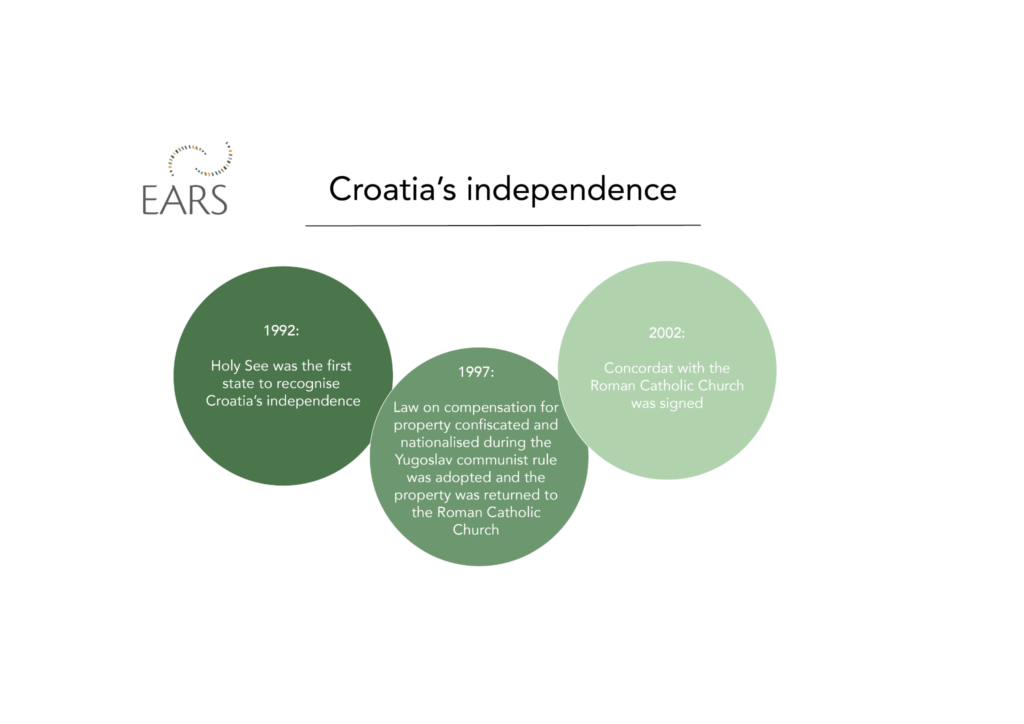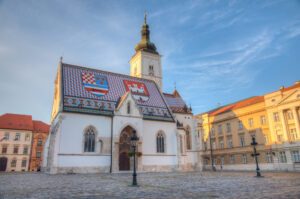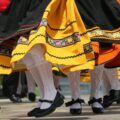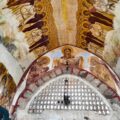The rule of Croatian nationalism and Roman Catholicism
The rule of Croatian nationalism and Roman Catholicism
In an attempt to replace communist norms, Croatian society now knows two normative codes. One is prescribed by the Roman Catholic Church, the other by nationalism.
This article is part of our series on normativity in Europe.
Behind the Iron Curtain, communism is the only bubble
Croatia spent the entire period from the Second World War until the collapse of the Eastern Bloc in 1991[1] under the communist regime in Yugoslavia. “Religion is the opium of the people” was the slogan of communist ideology in favour of propaganda for an atheist state without religion.[2] Before the communist regime, Croatia was a predominantly Roman Catholic country, but when it found itself behind the Iron Curtain, the Roman Catholic Church was thrown to its knees.[3] The Communist Party of Yugoslavia expelled the Roman Catholic Faculty of Theology from the University of Zagreb in 1952.[4] The only judge of morally appropriate behaviour was communist ideology. For example, abortion was socially acceptable and allowed by law,[5] homosexuality was a crime (according to the Criminal Law 1959),[6] and church marriage was not recognised by law.[7]
The Communist Party was the only party that reigned in Yugoslavia as well as in Croatia.[8] The communist ideology was imposed by the state as the only correct and ethically acceptable perspective and the Roman Catholic Church was marginalised and oppressed.[9] This made it impossible for different norms of socially acceptable behaviour to exist. Although the Communist Party attempted to create a classless society in Croatia, it did not fully succeed in doing so. There was some opposition, but it was small and very weak in relation to strong state propaganda. On the margins of society were those who were opponents of the Communist Party’s ideology and moral norms.[10] These opponents were primarily members of the old royal family and the religious community. The king was deprived of his civil rights and was forbidden to return to Yugoslavia.[11]
The church bells of the Roman Catholic Church are not heard behind the Iron Curtain
The Roman Catholic Church in Croatia in communist Yugoslavia was under the jurisdiction of the Holy See. Believers of the Roman Catholic Church in Croatia expected that the pope and the Roman Curia would protect them from communist terror.[12]
Yet, even diplomatic relations between the Vatican and Yugoslavia were severed in 1952.[13] Believers did not feel any improvement due to these events, because apart from mutual visits of Vatican and Yugoslav diplomats, no changes took place in the life of an ordinary believer.[14] The Roman Catholic Church was removed from the public and media sphere. It was forbidden to give sermons outside of church walls, and church holidays were replaced by working-class and Communist Party holidays. The only moral norms that existed were those prescribed and propagated by communist ideology. Since the communists did not tolerate resistance or opposition, Christian teachings were not welcome under the communist regime. Therefore, the Holy See could not do much for the Roman Catholics from behind the Iron Curtain.[15]
Croatia is free – a Roman Catholic religious purge follows
Croatia fought for its independence through a bloody civil war that lasted several years during the 1990s.[16] After the fall of communism, nationalism triumphed in Croatia. The Holy See was the first state to recognise Croatia’s independence on January 13, 1992.[17] The law on compensation for property confiscated and nationalised during the Yugoslav communist rule was adopted in 1997 and property was returned to the Roman Catholic Church.[18] Finally, a concordat with the Roman Catholic Church was signed in 2002.[19]

The Church has once more become financially powerful and very present in the public sphere. With the return of the Church to the public stage, the propagation of Christian morality also resumed. The Roman Catholic Faculty of Theology was returned to Zagreb University in 1990. Religious education was restored to the education system in 1991.[20]
Nationalism and the Roman Catholic Church as the undisputed rulers of social norms
The strength of Croatian nationalist policy and propaganda can be seen in those who are marginalised by it: the Serbs.[21] Although according to Croatian law, Serbs as a minority in Croatia have the right to their national alphabet (the Cyrillic alphabet), the board with the Cyrillic inscription on the city of Vukovar was broken by Croatian nationalists and a new one was never placed.[22] Furthermore, incidents such as the looting of Serbian Orthodox churches and the writing of graffiti on their walls, as well as other acts of oppression, became an almost daily occurrence.[23]
Nationalism was banned during communism, but it is now glorified as the greatest moral value of Croatian society. During national holidays, people celebrate Croatian nationalism by visiting the battlefields from the civil war in Yugoslavia (1991-1995), and graveyards where Croatian nationalists are buried.[24] War veterans or ‘Domobrani’ are now almost unofficially in charge of defending and glorifying nationalism in Croatia.[25] Communism has been abandoned and nationalism is now an omnipresent norm in Croatian society.[26]
Based on all of this, it can be concluded that nationalism in Croatia is a strict norm, in addition to the norms imposed by the Roman Catholic Church. The political elite cooperates very closely with the Roman Catholic Church. This could be seen when the President of Croatia, Kolinda Grabar-Kitarović, awarded the highest state decoration to Cardinal Kuharić (2020).[27] The Roman Catholic Church is very influential in the sphere of proposing and adopting moral norms. For example, it has called for a ban on abortion. In addition, it continues to cover up sexual abuse scandals[28] and appears to be complicit in attacks on the LGBTQ+ population.[29]
Although the Roman Catholic Church, together with nationalist movements, is unofficially in charge of moral norms, they also sometimes violate them. This was best seen during the COVID-19 pandemic. While all public gatherings were forbidden because of the pandemic, Mass in the Roman Catholic Church throughout Croatia was held without interruption and without a single punishment from the state or society.[30] This provides a good example of the close relationship between Croatian nationalism and the Church.
Croatian society has two normative codes: one prescribed by the Roman Catholic Church and one prescribed by the nationalist movement. This morality offers a substitute for communist norms. Although the communist ideology is a thing of the past, Croatian society is again seeking to be morally solid and firm with the norms prescribed by the Roman Catholic Church and the nationalist movement.
Our team of analysts conducts research on topics relating to religion and society. In the second half of 2021, we are focusing on the subject of normativity. Find out more on the EARS Dashboard.
Sources
[1] Raspad Istočnog bloka, Varšavskog pakta i SSSR-a
[2] SFR Jugoslavija kao inspirativan primjer ekumenizma
[3] Odnos komunističkih vlasti prema Katoličkoj crkvi i njenom djelovanju na području Općine Đakovo
[5] Abortus – čije je moje telo?
[6] Kako se kažnjavala homoseksualnost u Jugoslaviji
[7] Brak i razvod između prošlosti i budućnosti
[9] Odnos komunističkih vlasti prema Katoličkoj crkvi i njenom djelovanju na području Općine Đakovo
[10] Odnos komunističkih vlasti prema Katoličkoj crkvi i njenom djelovanju na područiju Općine Đakovo
[12] SFR Jugoslavija kao inspirativni prijer ekumenizma
[13] SFR Jugoslavija kao inspirativni primjer ekumenizma
[14] SFR Jugoslavija kao inspirativni primjer ekumenizma
[15] Odnos komunističkih vlasti prema Katoličkoj crkvi i njenom djelovanju na području Općine Đakovo
[17] Katolička crkva u Hrvatskoj u XX stoljeću
[18] Pitanje povratak oduzete imovine Katoličkoj crkvi i problem tumačenja Ugovora o pravnim pitanjima između Republike Hrvatske i Svete Stolice
[19] Nadbiskup Migliore o provođenju ugovora između Svete Stolice i Republike Hrvatske
[21] Srbi u Hrvatskoj i dalje na margini
[22] Umjesto na pločama u Vukovaru, gradonačelnik ćirilicu bacio na pod
[23] Vandalizam u Srpskoj crkvi u Hrvatskoj
[25] Lažu i na srpskoj i na hrvatskoj strani
[26] Hrvatska: NAcionalizam i ekstremizam su još uvijek svakodnevica
[27] Kolinda Grabar Kitarović završava svoj predsednički mandat
[28] Marš protiv abortusa uz Tompsona, kontraproteste i privođenja






